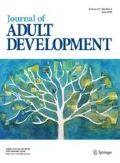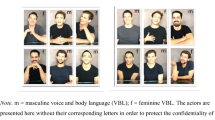Abstract
The present study investigated age and gender differences in forgiveness of real-life transgressions. Emerging and young, middle-aged, and older adults recalled the most recent and serious interpersonal transgression and then completed the Transgression-Related Interpersonal Motivations Inventory (TRIM-18), which measured their avoidance, revenge, and benevolence motivation toward an offender and indicated to what extent they are generally concerned with the subject of forgiveness. The results revealed a trend among middle-aged adults to express more avoidance than younger adults. Moreover, young men had a greater motivation to seek revenge than middle-aged and older men. No such age differences were apparent for women. Additionally, forgiveness was a more manifest subject in everyday life for middle-aged adults and women. These findings emphasize the importance of age and gender when investigating forgiveness.


Similar content being viewed by others
References
Allemand, M. (2008). Age differences in forgiveness: The role of future time perspective. Journal of Research in Personality, 42, 1137–1147.
Allemand, M., & Steiner, M. (2010). Verzeihen und Selbstverzeihen über die Lebensspanne: Gegenwärtiger Forschungsstand und Forschungsperspektiven. [Forgiveness and self-forgiveness across the lifespan: Current status and future directions]. Zeitschrift für Entwicklungspsychologie und Pädagogische Psychologie, 42, 63–78.
Allemand, M., Amberg, I., Zimprich, D., & Fincham, F. D. (2007). The role of trait forgiveness and relationship satisfaction in episodic forgiveness. Journal of Social and Clinical Psychology, 26, 199–217.
Archer, J. (2004). Sex differences in aggression in real-world settings: A meta-analytic review. Review of General Psychology, 8, 291–322.
Berry, J. W., Worthington, E. L., Jr., Parrot, L., O’Connor, L. E., & Wade, N. G. (2001). Dispositional forgiveness: Development and construct validity of the transgression narrative test of forgiveness (TNTF). Personality and Social Psychology Bulletin, 27, 1277–1290.
Birditt, K. S., Fingerman, K. L., & Almeida, D. M. (2005). Age differences in exposure and reactions to interpersonal tensions: A daily diary study. Psychology and Aging, 20, 330–340.
Bono, G., & McCullough, M. E. (2004). Religion, forgiveness, and adjustment in older adults. In K. W. Schaie, N. Krause, & A. Booth (Eds.), Religious influences on health and well-being in the elderly (pp. 163–186). New York: Springer.
Brose, L. A., Rye, M. S., Lutz-Zois, C., & Ross, S. R. (2005). Forgiveness and personality traits. Personality and Individual Differences, 39, 35–46.
Cano, A., & O’Leary, K. D. (2000). Infidelity and separations precipitate major depressive episodes and symptoms of non-specific depression and anxiety. Journal of Consulting and Clinical Psychology, 68, 774–781.
Carson, J. W., Keefe, F. J., Goli, V., Fras, A. M., Lynch, T. R., Throp, S. R., et al. (2005). Forgiveness and chronic low back pain: A preliminary study examining the relationship of forgiveness to pain, anger, and psychological distress. Journal of Pain, 6, 84–91.
Carstensen, L. L., Isaacowitz, D. M., & Charles, S. T. (1999). Taking time seriously: A theory of socioemotional selectivity. American Psychologist, 54, 165–181.
Cashdan, E. (1998). Are men more competitive than women? British Journal of Social Psychology, 37, 213–229.
Darby, B. W., & Schlenker, B. R. (1982). Children’s reactions to apologies. Journal of Personality and Social Psychology, 43, 742–753.
Day, L., & Maltby, J. (2005). Forgiveness and social loneliness. Journal of Psychology, 139, 553–555.
Eisenberger, N. I., Liebermann, M. D., & Williams, K. D. (2003). Does rejection hurt? An fMRI study to social exclusion. Science, 302, 290–292.
El-Sheikh, M., Buckhalt, J. A., & Reiter, S. L. (2000). Gender-related effects in emotional responding to resolved and unresolved interpersonal conflict. Sex Roles, 43, 719–734.
Erskine, J. A. K., Kvavilashvili, L., & Kornbrot, D. E. (2007). The predictors of thought suppression in young and old adults: Effects of rumination, anxiety, and other variables. Personality and Individual Differences, 42, 1047–1057.
Feivel, H., & Strack, S. (1989). Coping with conflict situations: Middle-aged and elderly men. Psychology and Aging, 4, 26–33.
Fincham, F. D. (2000). The kiss of the porcupines: From attributing responsibility to forgiving. Personal Relationships, 7, 1–23.
Girard, M., & Mullet, E. (1997). Forgiveness in adolescents, young, middle-aged, and older adults. Journal of Adult Development, 4, 209–220.
Goeleven, E., De Raedt, R., & Dierckx, E. (2010). The positivity effect in older adults: The role of affective interference and inhibition. Aging and Mental Health, 14, 129–137.
Heckhausen, J., Dixon, R. A., & Baltes, P. B. (1989). Gains and losses in development throughout adulthood as perceived by different age groups. Developmental Psychology, 25, 109–121.
Idler, E. L., & Kasl, S. (1991). Health perceptions and survival: Do global evaluations of health status really predict mortality?. Journal of Gerontology: Psychological Sciences and Social Sciences, 46, 55–65.
Idler, E. L., & Kasl, S. (1995). Self-ratings of health: Do they also predict change in functional ability? Journal of Gerontology: Psychological Sciences and Social Sciences, 50, 344–353.
Karremans, J. C., & Van Lange, P. A. M. (2004). Back to caring after being hurt: The role of forgiveness. European Journal of Social Psychology, 34, 207–227.
Karremans, J. C., Van Lange, P. A. M., Ouwerkerk, J. W., & Kluwer, E. S. (2003). When forgiving enhances psychological well-being: The role of interpersonal commitment. Journal of Personality and Social Psychology, 84, 1011–1026.
Kearns, J. N., & Fincham, F. D. (2004). A prototype analysis of forgiveness. Personality and Social Psychology Bulletin, 30, 838–855.
Kendler, K. S., Hettema, J. M., Butera, F., Gardner, C. O., & Prescott, C. A. (2003). Life events dimensions of loss, humiliation, entrapment, and danger in the prediction of onsets of major depression and generalized anxiety. Archives of General Psychiatry, 60, 789–796.
Lawler, K. A., Younger, J. W., Piferi, R. L., Jobe, R. L., Edmondson, K. A., & Jones, W. H. (2005). The unique effects of forgiveness on health: An exploration of pathways. Journal of Behavioral Medicine, 28, 157–167.
Lazarus, R. S. (1999). Stress and emotion: A new synthesis. New York: Springer Publishing.
Luong, G., Charles, S. T., & Fingerman, K. L. (2011). Better with age: Social relationships across adulthood. Journal of Social and Personal Relationships, 28, 9–23.
Maltby, J., Macaskill, A., & Gillett, R. (2007). The cognitive nature of forgiveness: Using cognitive strategies of primary appraisal and coping to describe the process of forgiving. Journal of Clinical Psychology, 63, 555–566.
McCullough, M. E., & Hoyt, W. T. (2002). Transgression-related motivational dispositions: Personality substrates of forgiveness and their links with the big five. Personality and Social Psychology Bulletin, 28, 1556–1573.
McCullough, M. E., Rachal, K. C., Sandage, S. J., Worthington, E. L., Brown, S. W., & Hight, T. L. (1998). Interpersonal forgiving in close relationships II: Theoretical elaboration and measurement. Journal of Personality and Social Psychology, 75, 1586–1603.
McCullough, M. E., Fincham, F. D., & Tsang, J. (2003). Forgiveness, forbearance, and time: The temporal unfolding of transgression-related interpersonal motivations. Journal of Personality and Social Psychology, 84, 540–557.
McCullough, M. E., Root, L. M., & Cohen, A. D. (2006). Writing about the benefits of an interpersonal transgression facilitates forgiveness. Journal of Consulting and Clinical Psychology, 74, 887–897.
Miles, M. B., & Huberman, A. M. (1994). Qualitative data analysis: An expanded sourcebook. Thousand Oaks, California: Sage.
Miller, A. J., Worthington, E. L., & McDaniel, M. A. (2008). Gender and forgiveness: A meta-analytic review and research agenda. Journal of Social and Clinical Psychology, 27, 845–878.
Mullet, E., & Girard, M. (2000). Development and cognitive points of view on forgiveness. In M. E. McCullough, K. I. Pargament, & C. E. Thoresen (Eds.), Forgiveness: Theory, research and practice (pp. 111–132). New York: Guilford Press.
Mullet, E., Houdbine, A., Laumonier, S., & Girard, M. (1998). Forgivingness: Factor structure in a sample of young, middle-aged, and older adults. European Psychologist, 3, 289–297.
Nolen-Hoeksema, S., & Jackson, B. (2001). Mediators of the gender difference in rumination. Psychology of Women Quarterly, 25, 37–47.
Orcutt, H. K. (2006). The prospective relationship of interpersonal forgiveness and psychological distress symptoms among college women. Journal of Counseling Psychology, 53, 350–361.
Phillips, L. H., Henry, J. D., Hosie, J. A., & Milne, A. B. (2006). Age, anger regulation and well-being. Aging and Mental Health, 10, 250–256.
Romero, C., & Mitchell, D. B. (2008). Forgiveness of interpersonal offenses in younger and older roman catholic women. Journal of Adult Development, 15, 55–61.
Rye, M. S., Pargament, K. I., Ali, M. A., Beck, G. L., Dorff, E. N., Hallisey, C., et al. (2000). Religious perspectives on forgiveness. In M. E. McCullough, K. I. Pargament, & C. E. Thoresen (Eds.), Forgiveness: Theory, research, and practice (pp. 17–40). New York: Guilford.
Shulman, S., Tuval-Mashiach, R., Levran, E., & Anbar, S. (2006). Conflict resolution patterns and longevity of adolescent romantic couples: A 2-year follow-up study. Journal of Adolescence, 29, 575–588.
Sorkin, D. H., & Rook, K. S. (2006). Dealing with negative social exchange in later life: Coping responses, goals, and effectiveness. Psychology and Aging, 21, 715–725.
Subkoviak, M., Enright, R., Wu, C.-R., Gassin, E., Freedman, S., Olson, L., et al. (1995). Measuring interpersonal forgiveness in late adolescence and middle adulthood. Journal of Adolescence, 18, 641–655.
Sukhodolsky, D. G., Golub, A., & Cromwell, E. N. (2001). Development and validation of the anger rumination scale. Personality and Individual Differences, 31, 689–700.
Toussaint, L. L., & Webb, J. R. (2005). Gender differences in the relationship between empathy and forgiveness. The Journal of Social Psychology, 145, 673–685.
Toussaint, L. L., Williams, D. T., Musick, M. A., & Everson, S. A. (2001). Forgiveness and health: Age differenced in a US probability sample. Journal of Adult Development, 8, 249–257.
Tsang, J., McCullough, M. E., & Fincham, F. D. (2006). The longitudinal association between forgiveness and relationship closeness and commitment. Journal of Social and Clinical Psychology, 25, 448–472.
Verona, E., Reed, A., I. I., Curtin, J. J., & Pole, M. (2007). Gender differences in emotional and overt/covert aggressive responses to stress. Aggressive Behavior, 33, 261–271.
Willis, S. L., & Martin, M. (2005). Middle adulthood: A lifespan perspective. Thousand Oaks, CA: Sage.
Worthington, E. L., Jr. (Ed.). (2005). Handbook of forgiveness. New York: Brunner-Routledge.
Worthington, E. L., Sandage, S. J., & Berry, J. W. (2000). Group interventions to promote forgiveness: What researchers and clinicians ought to know. In M. E. McCullough, K. I. Pargament, & C. E. Thoresen (Eds.), Forgiveness: Theory, research, and practice (pp. 228–253). New York, NY: Guilford Press.
Younger, J. W., Piferi, R. L., Jobe, R. L., & Lawler, K. A. (2004). Dimensions of forgiveness: The view of laypersons. Journal of Social and Personal Relationships, 21, 837–855.
Acknowledgments
This research was supported by a research grant from the University of Zurich (Forschungskredit 2005) to the second author. The authors would like to extend their special thanks to Catherine Ghaemmaghami, Assad Ghaemmaghami and Roberto La Marca for their valuable comments on this manuscript and also to Vicki Annaheim and Barbara Stauffer for rating the findings of the qualitative data analysis.
Author information
Authors and Affiliations
Corresponding authors
Rights and permissions
About this article
Cite this article
Ghaemmaghami, P., Allemand, M. & Martin, M. Forgiveness in Younger, Middle-Aged and Older Adults: Age and Gender Matters. J Adult Dev 18, 192–203 (2011). https://doi.org/10.1007/s10804-011-9127-x
Published:
Issue Date:
DOI: https://doi.org/10.1007/s10804-011-9127-x




